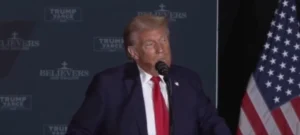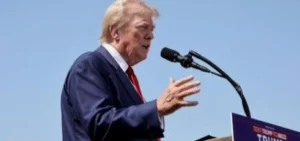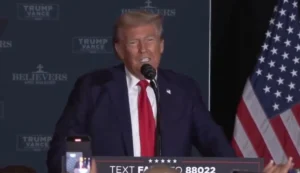Trump’s Claims of UK Labour Party Election Interference: Political Allegations: Echoes from the Deep
 In recent political discourse, former President Donald Trump has made headlines with his allegations regarding interference by the UK Labour Party in the upcoming 2024 U.S. elections. This assertion has sparked a wave of reactions from various political analysts, commentators, and party officials. This article explores the details of Trump’s claims, the context surrounding them, and the potential implications for both U.S. and UK politics.
In recent political discourse, former President Donald Trump has made headlines with his allegations regarding interference by the UK Labour Party in the upcoming 2024 U.S. elections. This assertion has sparked a wave of reactions from various political analysts, commentators, and party officials. This article explores the details of Trump’s claims, the context surrounding them, and the potential implications for both U.S. and UK politics.
Understanding Trump’s Allegations
During a rally in Georgia, Trump asserted that the Labour Party in the UK is conspiring to influence the U.S. elections against him. He characterized this as a coordinated effort to undermine his candidacy and sway American voters in favor of his political opponents.
The specific nature of these claims has not been substantiated with concrete evidence, leading to skepticism among political analysts. Trump’s statements come amid heightened scrutiny of foreign interference in elections, particularly following investigations into Russian meddling in the 2016 presidential election.
His comments reflect a broader narrative that seeks to frame his political struggles as a result of external conspiracies rather than internal party dynamics or voter sentiment.
Contextual Background
The backdrop to these allegations includes a tense political climate in both the U.S. and the UK. In the U.S., Trump faces significant challenges as he seeks to secure the Republican nomination amidst a crowded field of candidates.
Meanwhile, in the UK, the Labour Party is gearing up for its own electoral battles, with leader Keir Starmer positioning the party as a viable alternative to the ruling Conservatives.
The timing of Trump’s remarks is particularly noteworthy, coinciding with key moments in both countries’ political calendars. As both parties prepare for elections, narratives around foreign influence and election integrity are likely to become increasingly prominent.
Reactions from Political Figures
The response from UK politicians has been swift. Labour officials have dismissed Trump’s claims as baseless and politically motivated. They argue that such allegations distract from real issues affecting voters and undermine democratic processes.
In contrast, some Republican allies have echoed Trump’s sentiments, framing them as part of a larger narrative about election integrity and foreign interference.
This division highlights how Trump’s rhetoric continues to resonate within certain segments of the Republican base while alienating others who prioritize evidence-based discourse.
Implications for U.S.-UK Relations
 Trump’s allegations could have broader implications for U.S.-UK relations. Historically, both countries have enjoyed a “special relationship,” characterized by close cooperation on various fronts, including trade, security, and intelligence sharing.
Trump’s allegations could have broader implications for U.S.-UK relations. Historically, both countries have enjoyed a “special relationship,” characterized by close cooperation on various fronts, including trade, security, and intelligence sharing.
However, inflammatory rhetoric can strain diplomatic ties and complicate collaborative efforts. As leaders from both nations navigate these politically charged waters, it remains crucial for them to maintain open lines of communication to prevent misunderstandings that could escalate tensions.
The Role of Media and Misinformation
In an age where misinformation can spread rapidly through social media platforms, Trump’s claims underscore the importance of responsible journalism and media literacy among the public.
Fact-checking organizations have already begun scrutinizing these allegations, emphasizing the need for accurate reporting in shaping public opinion.Media outlets play a critical role in contextualizing political statements and providing audiences with factual information.
As such, they must remain vigilant against sensationalism that can distort perceptions of reality.
Public Perception and Voter Sentiment
Public reaction to Trump’s claims will likely vary across different demographics. Polling data indicates that while some voters may resonate with his narrative of victimization by foreign entities, others may view these allegations as an attempt to deflect attention from pressing domestic issues such as inflation, healthcare, and immigration.
Understanding voter sentiment is essential for both parties as they strategize their campaigns leading up to the elections. Candidates who can effectively address constituents’ concerns while navigating complex narratives about foreign influence may find themselves better positioned for success at the polls.
Looking Ahead: The 2024 Elections
 As we approach the 2024 elections, Trump’s allegations about UK interference serve as a reminder of how intertwined global politics can be with local electoral dynamics. Candidates must be prepared to address not only domestic issues but also perceptions surrounding foreign involvement in their campaigns.
As we approach the 2024 elections, Trump’s allegations about UK interference serve as a reminder of how intertwined global politics can be with local electoral dynamics. Candidates must be prepared to address not only domestic issues but also perceptions surrounding foreign involvement in their campaigns.
Both major parties will need to craft messages that resonate with voters while also countering narratives that may arise during the campaign season. Transparency and accountability will be paramount as candidates seek to build trust with their constituents amidst swirling accusations.
Conclusion
Trump’s claims regarding alleged interference by the UK Labour Party add another layer of complexity to an already contentious electoral landscape. As political figures on both sides respond to these assertions, it remains crucial for voters to engage critically with information presented to them.
The interplay between domestic politics and international relations will undoubtedly shape the narrative leading up to November 2024. By fostering informed discussions rooted in facts rather than speculation, we can contribute to a healthier democratic process that prioritizes truth over sensationalism.
In summary, as we navigate this evolving political landscape filled with allegations and counterclaims, it is essential for all stakeholders—politicians, media professionals, and voters alike—to prioritize integrity and transparency above all else.
